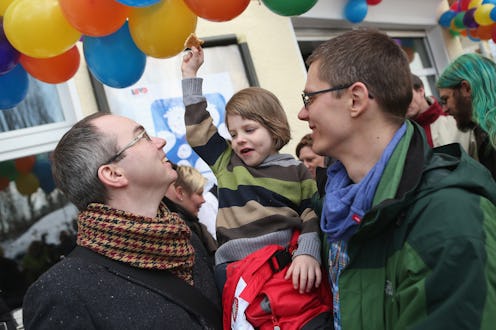In 2012, sociologist Mark Regnerus published a study in Social Science Research allegedly supporting the hypothesis that children of same-sex parents were more likely to be sexually abused, attempt suicide, and suffer from sexually transmitted diseases. This study challenged previously accepted research showing no differences between children of same-sex and different-sex couples and was used to support a ban on same-sex marriage in Michigan (which was struck down nevertheless).
Many LGBT parents and children of LGBT parents know from experience that these kids turn out just fine, and most research confirms this intuition. Ever since Regnerus published results to the contrary, numerous research-based efforts have cropped up to challenge them, including the Human Rights Campaign's website regnerusfallout.org and an audit conducted by Social Science Research itself.
And now, the most comprehensive analysis of Regnerus's study to date has exposed a number of flaws with the study, putting damaging stereotypes about same-sex parents to rest once and for all (though some will undoubtedly do their very best to keep them alive, because people are awful). According to this reexamination, conducted by Simon Cheng of the University of Connecticut and Brian Powell of Indiana University and also published in Social Science Research, the differences between children of gay and straight parents disappear once Regnerus's mistakes are accounted for. Here are some of the mistakes the researchers uncovered:
1. Many of the people in the study were not actually raised by same-sex parents.
First of all, it turns out most of Regnerus's experimental subjects actually didn't spend time with their gay or lesbian parents' partners — which means they were not, in fact, raised by same-sex parents (plural). In addition, about a third of the children spent four years or less living with the LGBT parents themselves. All but two of the people surveyed actually spent their earliest years with different-sex parents — providing the alternative conclusion that the parents' separation was the deciding factor in the children's later difficulties.
2. Some of the survey responses seemed pretty suspicious.
In addition to "proving" the harm incurred as a result of same-sex parenting, some of the study's participants also indicated that they either belonged in the circus, or may not have been reliable. One “was 7-feet 8-inches tall, weighed 88 pounds, was married eight times and had eight children.” Another was allegedly arrested at age one. I want to meet these people, because if anything, this study shows that children of gay parents do an awesome job trolling scientific experiments.
3. Mark Regnerus mysteriously included all this irrelevant data in his results.
It's standard practice for scientists to factor out data that doesn't actually measure what the study set out to measure, along with data from subjects who are either trolling or seriously confused. When New York Magazine asked Regnerus about the reevaluation of his study, he responded, “My mistakes were limited to the inclusion of a handful of oddball cases.” Yes, they were. And apparently the results were so weak to begin with that these oddball cases were enough to make or break them. I don't know about you, but that smacks of ulterior motives to me.
4. Actually, it turns out there likely were some ulterior motives.
Regnerus's study was sponsored by several conservative organizations against same-sex marriage, including The Witherspoon Institute and the Lynde and Harry Bradley Foundation. Ah-hah, there it is! Regnerus lied about his conservative funding, giving the illusion that the research was free from partisan influences. Oh, and he gave a lecture decrying "the normalization of gay men's sexual behavior in both contemporary porn and in the American imagination." Because God forbid we normalize anything other than sex between married, heterosexual couples in the missionary position with the lights off!
In all fairness, many of the scientists who found no difference between children of same- and different-sex couples probably also had their political beliefs at stake. The difference is, they have a larger and far more sound body of research to back up their stances — and now we can say that for sure.
Images: Giphy (4)
